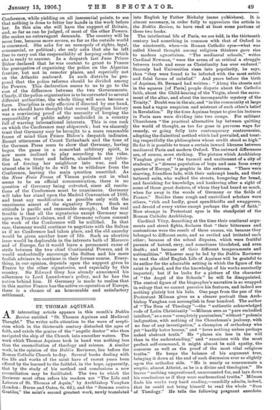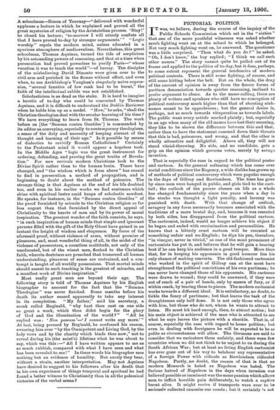' ST. THOMAS AQUINAS.
AN interesting article appears in this month's Dublin Review entitled "St. Thomas Aquinas and Medieval Thought." The writer calls attention to the wave of scepti- cism which in the thirteenth century disturbed the ages of faith, and extols the genius of the " angelic doctor " who then navigated the ship of the Church into smoother waters. The work which Thomas Aquinas took in hand was nothing less than the reconciliation of theology and science. A similar work, in the opinion of the Dublin Reviewer, lies before the Roman Catholic Church to-day. Several books dealing with the life and works of the saint have of recent years been offered by the learned to the faithful, in the hope, apparently, that by the study of his method and conclusions a new reconciliation may be facilitated. The two to which the Reviewer most often refers his readers are "The Life and Labours of St. Thomas of A quin," by Archbishop Vaughan (London : Burns and Oates, 6s. 6d.), and the " Summa contra Gentiles," the saint's second greatest work, newly translated into English by Father Rickaby (same publishers). It ie almost necessary, in order fully to appreciate the article in the Dublin Review, to have read at least some portions of these two books.
The intellectual life of Paris, we are told, in the thirteenth century had something in common with that of Oxford in the nineteenth, when—in Roman Catholic eyes—what was called liberal thought among religious thinkers gave rise to modern agnosticism. " The mediaeval schools," writes Cardinal Newman, " were the arena of as critical a struggle between truth and error as Christianity has ever endured." Scarcely had Universities risen into popularity, he says, than "they were found to be infected with the most subtle and fatal forms of unbelief." And years before the birth of Aquinas, St. Bernard had written : " Along the streets and in the squares [of Paris] people dispute about the Catholic faith, about the Child-bearing of the Virgin, about the sacra- ment of the altar, and about the incomparable mystery of the Trinity." Doubt was in the air, and " in the community at large men had a vague suspicion and mistrust of each other's belief in Revelation." By the time Aquinas began to give his lectures in Paris men were dividing into two camps. For militant Churchmen "the practical alternative lay between quitting the world of thought, as too far gone in perverse ways for remedy, or going fully into contemporary controversies, adopting the dialectical method which had prevailed, and treat- ing respectfully the philosophers whose credit stood so high." So far it is possible to trace a certain inward likeness between mediaeval Paris and modern Oxford. The outward differences are, of course, more striking. The picture which Archbishop Vaughan gives of "the turmoil and excitement of a city of students," a " diverse population of boys and men from every quarter of Europe," is graphic in the extreme. "There were starving, friendless lads, with their unkempt heads, and their tattered suits, who walked the streets, hungering for bread, and famishing for knowledge, and hankering after a sight of some of those great doctors, of whom they had heard so much, when far away in the woods of Germany or the fields of France." Besides these rough and uncivilised scholars were others, "rich and lordly, great spendthrifts and swaggerers, and devoid of every virtue except perhaps the gift of faith." How strange in Protestant eyes is the standpoint of the Roman Catholic Archbishop.
Cardinal Vitry, describing at the time their continual argu- ments and street fights, declares that " their bitterness and contentions were the result of three causes, viz. because they • belonged to different sects, and so reviled and irritated each other ; because of the school disputes, which were fruitful parents of hatred, envy, and sometimes bloodshed, and even death ; and because of their different temperaments and nationalities." Whoever may be led by the Dublin Reviewer to read the chief English Life of Aquinas will be grateful to its author for the admirable setting in which the figure of the saint is placed, and for the knowledge of his works succinctly imparted ; but if he looks for a picture of the character of " the Angel of the Schools " he will be disappointed. The central figure of the biographer's narrative is so wrapped in eulogy that we cannot perceive his features, and indeed see nothing plainly but his halo. One page from the pen of the Protestant Milman gives us a clearer portrait than Arch- bishop Vaughan can accomplish in four hundred. The author of " The Sum of Theology "—the " authentic acknowledged code of Latin Christianity "—Milman sees as "pure embodied intellect," as a man " completely passionless," without " polemio indignation, with nothing of the Churchman's jealousy, with no fear of any investigation," a champion of orthodoxy who • yet "hardly hates heresy," and " loves nothing unless perhaps naked abstract truth." He "places sin less in the will than in the understanding," and "examines with the most perfect self-command, it might almost be said apathy, the converse as well as the proof of the most vital religious truths." He keeps the balance of his argument true, bringing it down at the end of each discussion ever so slightly upon the orthodox side. " He is nearly as consummate a sceptic, almost Atheist, as he is a divine and theologian." He leaves " nothing unquestioned, unaccounted for, and lays down his conclusions as if they were mathematical truths." Milman finds his works very hard reading,—candidly admits, indeed, that he could not bring himself to read the whole "Sum of Theology." He tells the following pregnant anecdote. A schoolman—Simon of Tournay—" delivered with wonderful applause a lecture in which he explained and proved all the great mysteries of religion by the Aristotelian process. Stay!' he closed his lecture; 'to-morrow I will utterly confute all that I have proved to-day by stronger arguments. " "Logic worship" repels the modern mind, unless educated in a spurious atmosphere of mediaevalism. Nevertheless, this great schoolman, Thomas Aquinas, turned the tide of scepticism by his astounding powers of reasoning, and that at a time when persecution had proved powerless to purify Paris—" whose vocation it was to teach the world"—of heresy. Ten disciples of the misbelieving David. Dinanto were given over to the civil arm and perished in the flames without effect, and even when, to use Archbishop's Vaughan's singularly naive expres- sion, "several fanatics of low rank had to be burnt," the faith of the intellectual rabble was not established.
Scholasticism is as dead as the stake. It is hard to imagine a heretic of to-day who could be converted by Thomas Aquinas, and it is difficult to understand the Dublin Reviewer when he holds him up as a model. " How," he asks, " shall the Christian theologian deal with the secular learning of his time P We have everything to learn from St. Thomas. The work before us [the ' Summa contra Gentiles'] is commended by its editor as conveying, especially to contemporary theologians, a sense of the duty and necessity of keeping abreast of the thought and learning of their age." Is it possible by means of dialectics to revivify Roman Catholicism ? Certainly to the Protestant mind it would appear a hopeless task. In the Middle Ages " logic was the great instrument for ordering, defending, and proving the great truths of Revela- tion." For new revivals modern Christians look to the Divine Spirit rather than to the human brain. Times have changed, and " the wisdom which is from above " has ceased to find in persecution a method of propagation, and is beginning to doubt about the method of polemics. The strange thing is that Aquinas at the end of his life doubted too, and even in his earlier works we find sentences which shine with spiritual lustre amid heaps of scholastic sawdust. He speaks, for instance, in the "Summa contra Gentiles" of the proof furnished by miracle to the Christian religion as far less cogent than that furnished by the direct appeal of Christianity to the hearts of men and by its power of moral inspiration. The greatest wonder of the faith consists, he says, " in such inspiration of human minds that simple and ignorant persons filled with the gift of the Holy Ghost have gained in an instant the height of wisdom and eloquence. By force of the aforesaid proof, without violence of arms, without promise of pleasures, and, most wonderful thing of all, in the midst of the violence of persecutors, a countless multitude, not only of the uneducated, but of the wisest men, flocked to the Christian faith, wherein doctrines are preached that transcend all human understanding, pleasures of sense are restrained, and a con- tempt is taught of all worldly possessions. That mortal minds should assent to such teaching is the greatest of miracles, and a manifest work of Divins inspiration."
Most really great men see beyond their age. The following story is told of Thomas Aquinas by his English biographer to account for the fact that the " Summa Theologiae " was never finished. Some months before his death its author ceased apparently to take any interest in its completion. " My father," said his secretary, a monk called Reginald, " why hest thou cast on one side so great a work, which thou didst begin for the glory of God and the illumination of the world ? " "All he replied was : ' Non possum'—' I cannot write any more.' " At last, being pressed by Reginald, he confessed his reason, swearing him over " by the Omnipotent and Living God, by the holy vows and by the charity which binds thee now," not to reveal during his (the saint's) lifetime what he was about to say, which was this :—" All I have written appears to me as so much rubbish, compared with what I have seen and what has been revealed to me !" In these words his biographer sees nothing but an evidence of humility. But surely they bear, without a strain, another interpretation. May not Aquinas have desired to suggest to his followers after his death that in his own experience of things temporal and spiritual he had found a better witness to Christianity than in all the polemical victories of the verbal arena P











































 Previous page
Previous page